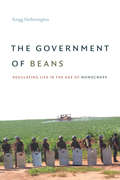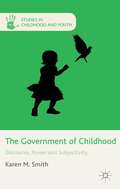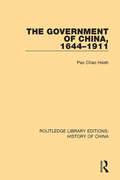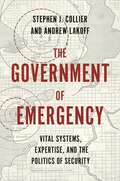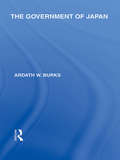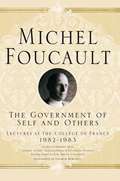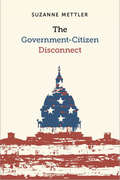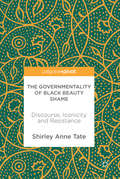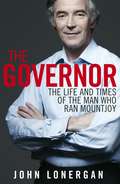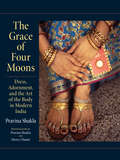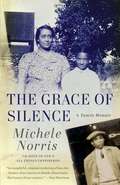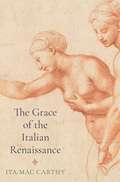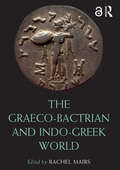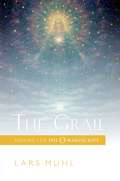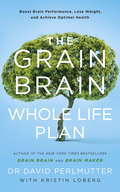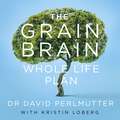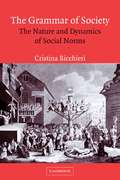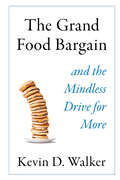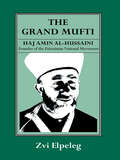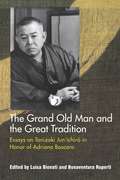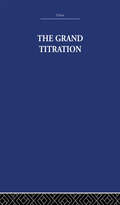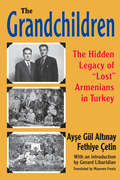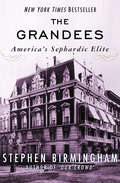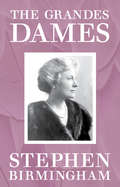- Table View
- List View
The Government of Beans: Regulating Life in the Age of Monocrops
by Kregg HetheringtonThe Government of Beans is about the rough edges of environmental regulation, where tenuous state power and blunt governmental instruments encounter ecological destruction and social injustice. At the turn of the twenty-first century, Paraguay was undergoing dramatic economic, political, and environmental change due to a boom in the global demand for soybeans. Although the country's massive new soy monocrop brought wealth, it also brought deforestation, biodiversity loss, rising inequality, and violence. Kregg Hetherington traces well-meaning attempts by bureaucrats and activists to regulate the destructive force of monocrops that resulted in the discovery that the tools of modern government are at best inadequate to deal with the complex harms of modern agriculture and at worst exacerbate them. The book simultaneously tells a local story of people, plants, and government; a regional story of the rise and fall of Latin America's new left; and a story of the Anthropocene writ large, about the long-term, paradoxical consequences of destroying ecosystems in the name of human welfare.
The Government of Childhood
by Karen M. SmithGrounded in the Foucauldian literature on governmentality and drawing on a broad range of disciplines, this book examines the government of childhood in the West from the early modern period to the present. The book deals with three key time-periods and examines shifts in the conceptualization and regulation of childhood and child-rearing.
The Government of China, 1644-1911 (Routledge Library Editions: History of China #8)
by Pao Chao HsiehThis volume, first published in 1925, presents a clear background to the then-contemporary political situation in China, and in doing so sheds much light on the history of Chinese politics. In focusing on the political organization it generates an insightful study of Chinese government.
The Government of Emergency: Vital Systems, Expertise, and the Politics of Security (Princeton Studies in Culture and Technology #28)
by Stephen J. Collier Andrew LakoffThe origins and development of the modern American emergency stateFrom pandemic disease, to the disasters associated with global warming, to cyberattacks, today we face an increasing array of catastrophic threats. It is striking that, despite the diversity of these threats, experts and officials approach them in common terms: as future events that threaten to disrupt the vital, vulnerable systems upon which modern life depends.The Government of Emergency tells the story of how this now taken-for-granted way of understanding and managing emergencies arose. Amid the Great Depression, World War II, and the Cold War, an array of experts and officials working in obscure government offices developed a new understanding of the nation as a complex of vital, vulnerable systems. They invented technical and administrative devices to mitigate the nation’s vulnerability, and organized a distinctive form of emergency government that would make it possible to prepare for and manage potentially catastrophic events.Through these conceptual and technical inventions, Stephen Collier and Andrew Lakoff argue, vulnerability was defined as a particular kind of problem, one that continues to structure the approach of experts, officials, and policymakers to future emergencies.
The Government of Japan (Routledge Library Editions: Japan)
by Ardath BurksThis book takes a clear look at the course of the economic and political developments in Japan since the Second World War and in particular trends in government and politics since the peace treaty of 1952. It examines the disagreements within the country over re-armament and security; over neutralism versus commitment in the Cold War; over conflicting loyalties to an Asian or a European way of life; and over meeting the rising economic and social expectations of the new middle class.
The Government of Self and Others: Lectures at the College de France, 1982-1983
by Michel Foucault Graham Burchell Arnold I. DavidsonAn exciting and highly original examination of the practices of truth-telling and speaking out freely (parr'sia) in ancient Greek tragedy and philosophy. Foucault discusses the difficult and changing practices of truth-telling in ancient democracies and tyrannies and offers a new perspective on the specific relationship of philosophy to politics.
The Government-Citizen Disconnect
by Suzanne MettlerAmericans’ relationship to the federal government is paradoxical. Polls show that public opinion regarding the government has plummeted to all-time lows, with only one in five saying they trust the government or believe that it operates in their interest. Yet, at the same time, more Americans than ever benefit from some form of government social provision. Political scientist Suzanne Mettler calls this growing gulf between people’s perceptions of government and the actual role it plays in their lives the "government-citizen disconnect." In The Government-Citizen Disconnect, she explores the rise of this phenomenon and its implications for policymaking and politics. Drawing from original survey data which probed Americans’ experiences of 21 federal social policies -- such as food stamps, Social Security, Medicaid, and the home mortgage interest deduction -- Mettler shows that 96 percent of adults have received benefits from at least one of them, and that the average person has utilized five. Overall usage rates transcend social, economic, and political divisions, and most Americans report positive experiences of their policy experiences. However, the fact that they have benefited from these policies has little positive effect on people’s attitudes toward government. Mettler finds that shared identities and group affiliations, as well as ideological forces, are more powerful and consistent influences. In particular, those who oppose welfare tend to extrapolate their unfavorable views of it to government in general. Deep antipathy toward the government has emerged as the result of a conservative movement that has waged a war on social welfare policies for over forty years, even as economic inequality and benefit use have increased. Mettler finds that voting patterns exacerbate the government-citizen disconnect, as those holding positive views of federal programs and supporting expanded benefits have lower rates of political participation than those holding more hostile views of the government. As a result, the loudest political voice belongs to those who have benefited from policies but who give government little credit for their economic well-being, seeing their success more as a matter of their own deservingness. This contributes to the election of politicians who advocate cutting federal social programs. According to Mettler, the government-citizen disconnect frays the bonds of representative government and democracy. The Government-Citizen Disconnect illuminates a paradox that increasingly shapes American politics. Mettler's examination of hostility toward government at a time when most Americans will at some point rely on the social benefits it provides helps us better understand the roots of today's fractious political climate.
The Governmentality of Black Beauty Shame
by Shirley Anne TateThis book uses the experiences and conversations of Black British women as a lens to examine the impact of discourses surrounding Black beauty shame. Black beauty shame exists within racialized societies which situate white beauty as iconic, and as a result produce Black ‘ugliness’ as a counterpoint. At the same time, Black Nationalist discourses present Black-white ‘mixed race’ women as bodies out of place within the Black community. In the examples analysed within the book, women disidentify from both the iconicities of white beauty and the discourses of Black Nationalist darker-skinned beauty, negating both ideals. This demonstration of Foucaldian counter-conduct can be read as a form of disalienation from the governmentality of Black beauty shame. This fascinating volume will be of interest to students and scholars of Black identity, Black beauty and discourse analysis.
The Governor
by John LonerganIn his talks to communities throughout the length and breath of Ireland, John Lonergan finds himself coming back to one theme: the importance of kindness. It is an unexpected theme for the former boss of Ireland's biggest and toughest prison, Mountjoy, but then John Lonergan is an unusual man. John entered the prison service in 1968 and in the years that followed, as he saw human nature at its worst - and often, unexpectedly, at its best - he developed a deep understanding both of human nature and of Irish society.Now, after 42 years in the service, 26 of them as the most senior prison officer in the country, John tells his fascinating life story - from his idyllic childhood in rural Tipperary, to coming face to face with the ugliest face of Irish life, to grappling with the politics of working in a service that was the plaything of officials and politicians. His description of life in the prison service is not only a gripping account of humanity at its rawest, but also an invaluable primer for anyone in top level management.Revealing, surprising and inspiring The Governor gives a unique insight into modern Ireland.
The Grace of Four Moons
by Pravina ShuklaBecause clothing, food, and shelter are basic human needs, they provide excellent entries to cultural values and individual aesthetics. Everyone gets dressed every day, but body art has not received the attention it deserves as the most common and universal of material expressions of culture. The Grace of Four Moons aims to document the clothing decisions made by ordinary people in their everyday lives. Based on fieldwork conducted primarily in the city of Banaras, India, Pravina Shukla conceptualizes and realizes a total model for the study of body art--understood as all aesthetic modifications and supplementations to the body. Shukla urges the study of the entire process of body art, from the assembly of raw materials and the manufacture of objects, through their sale and the interactions between merchants and consumers, to the consumer's use of objects in creating personal decoration.
The Grace of Silence: A Memoir
by Michele NorrisIn the wake of talk of a "postracial" America upon Barack Obama's ascension as president of the United States, Michele Norris, cohost of National Public Radio's flagship program All Things Considered, set out to write, through original reporting, a book about "the hidden conversation" on race that is unfolding nationwide. She would, she thought, base her book on the frank disclosures of others on the subject, but she was soon disabused of her presumption when forced to confront the fact that "the conversation" in her own family had not been forthright. Norris unearthed painful family secrets that compelled her to question her own self-understanding: from her father's shooting by a Birmingham police officer weeks after his discharge from the navy at the conclusion of World War II to her maternal grandmother's peddling pancake mix as an itinerant Aunt Jemima to white farm women in the Midwest. In what became a profoundly personal and bracing journey into her family's past, Norris traveled from her childhood home in Minneapolis to her ancestral roots in the Deep South to explore the reasons for the "things left unsaid" by her father and mother when she was growing up, the better to come to terms with her own identity. Along the way she discovered how her character was forged by both revelation and silence. Extraordinary for Norris's candor in examining her own racial legacy and what it means to be an American, The Grace of Silence is also informed by rigorous research in its evocation of time and place, scores of interviews with ordinary folk, and wise observations about evolving attitudes, at once encouraging and disturbing, toward race in America today. For its particularity and universality, it is powerfully moving, a tour de force.From the Hardcover edition.
The Grace of the Italian Renaissance
by Ita Mac CarthyHow grace shaped the Renaissance in Italy"Grace" emerges as a keyword in the culture and society of sixteenth-century Italy. The Grace of the Italian Renaissance explores how it conveys and connects the most pressing ethical, social and aesthetic concerns of an age concerned with the reactivation of ancient ideas in a changing world. The book reassesses artists such as Francesco del Cossa, Raphael and Michelangelo and explores anew writers like Castiglione, Ariosto, Tullia d'Aragona and Vittoria Colonna. It shows how these artists and writers put grace at the heart of their work.Grace, Ita Mac Carthy argues, came to be as contested as it was prized across a range of Renaissance Italian contexts. It characterised emerging styles in literature and the visual arts, shaped ideas about how best to behave at court and sparked controversy about social harmony and human salvation. For all these reasons, grace abounded in the Italian Renaissance, yet it remained hard to define. Mac Carthy explores what grace meant to theologians, artists, writers and philosophers, showing how it influenced their thinking about themselves, each other and the world.Ambitiously conceived and elegantly written, this book portrays grace not as a stable formula of expression but as a web of interventions in culture and society.
The Graeco-Bactrian and Indo-Greek World (Routledge Worlds)
by Rachel MairsThis volume provides a thorough conspectus of the field of Graeco-Bactrian and Indo-Greek studies, mixing theoretical and historical surveys with critical and thought-provoking case studies in archaeology, history, literature and art. The chapters from this international group of experts showcase innovative methodologies, such as archaeological GIS, as well as providing accessible explanations of specialist techniques such as die studies of coins, and important theoretical perspectives, including postcolonial approaches to the Greeks in India. Chapters cover the region’s archaeology, written and numismatic sources, and a history of scholarship of the subject, as well as culture, identity and interactions with neighbouring empires, including India and China. The Graeco-Bactrian and Indo-Greek World is the go-to reference work on the field, and fulfils a serious need for an accessible, but also thorough and critically-informed, volume on the Graeco-Bactrian and Indo-Greek kingdoms. It provides an invaluable resource for anyone interested in the Hellenistic East. The Introduction and Chapter 17 of this book is freely available as a downloadable Open Access PDF at http://www.taylorfrancis.com under a Creative Commons Attribution-Non Commercial-No Derivatives (CC-BY-NC-ND) 4.0 license
The Grail: The Scandinavian Bestseller
by Lars MuhlThe Grail is neither a secret, a world treasure in the shape of a cup, a specific mortal woman, nor a hidden, chosen family.The Grail is a state of heart and mind!An old Spanish manuscript is given to Lars, and for two years it lies untouched in his office until one day the sun falls upon the book and Lars is drawn to pick it up once again. The pages reveal symbols and signs that he had not previously seen, and so begins the final part of his journey to discover the importance of the feminine archetype for our times.His travels take him to the caves of the holy mountain of Montsegur and on to the Southern Pyrenees and Mary Magdalene’s secret cave near Perillos. During his travels Lars meets a nameless Being of Light who presents him with the answers to many of today’s spiritual dogmas.
The Grain Brain Whole Life Plan: Boost Brain Performance, Lose Weight, and Achieve Optimal Health
by David PerlmutterThis is the definitive instruction book for the care and feeding of your brain! - Dr Mark Hyman, author The Blood Sugar Solution The official lifestyle companion guide to Dr. David Perlmutter's revolutionary approach to vibrant health, as described in his international bestsellers Grain Brain, The Grain Brain Cookbook, and Brain Maker.With over one million copies sold worldwide, Dr. Perlmutter's books have changed the lives of people across the globe, revealing the devastating truth about the effects of gluten on the brain and teaching us how to reprogram our genetic destiny.Now, Dr. Perlmutter has written the definitive, highly practical lifestyle guide offering readers a step-by-step plan to lower the risk of brain ailments while yielding other benefits, such as weight loss, relief from chronic conditions, and total body rejuvenation.Accessible and science-based, The Grain Brain Whole Life Plan provides readers with actionable information, including all the core nutritional advice they know and love from Grain Brain and Brain Maker, and going far beyond that in a comprehensive, personalised programme.From sleep to stress management, exercise, relationships, and more, The Grain Brain Whole Life Planwill teach you how to live happily and healthily ever after.
The Grain Brain Whole Life Plan: Boost Brain Performance, Lose Weight, and Achieve Optimal Health
by David PerlmutterThe official lifestyle companion guide to Dr. David Perlmutter's revolutionary approach to vibrant health, as described in his international bestsellers Grain Brain, The Grain Brain Cookbook, and Brain Maker. With over one million copies sold worldwide, Dr. Perlmutter's books have changed the lives of people across the globe, revealing the devastating truth about the effects of gluten on the brain and teaching us how to reprogram our genetic destiny. Now, Dr. Perlmutter has written the definitive, highly practical lifestyle guide offering readers a step-by-step plan to lower the risk of brain ailments while yielding other benefits, such as weight loss, relief from chronic conditions, and total body rejuvenation.Accessible and science-based, The Grain Brain Whole Life Plan provides readers with actionable information, including all the core nutritional advice they know and love from Grain Brain and Brain Maker, and going far beyond that in a comprehensive, personalised programme. From sleep to stress management, exercise, relationships, and more, The Grain Brain Whole Life Plan will teach you how to live happily and healthily ever after.(P)2016 Hachette Audio
The Grammar of Society: The Nature and Dynamics of Social Norms
by Cristina BicchieriIn The Grammar of Society, first published in 2006, Cristina Bicchieri examines social norms, such as fairness, cooperation, and reciprocity, in an effort to understand their nature and dynamics, the expectations that they generate, and how they evolve and change. Drawing on several intellectual traditions and methods, including those of social psychology, experimental economics and evolutionary game theory, Bicchieri provides an integrated account of how social norms emerge, why and when we follow them, and the situations where we are most likely to focus on relevant norms. Examining the existence and survival of inefficient norms, she demonstrates how norms evolve in ways that depend upon the psychological dispositions of the individual and how such dispositions may impair social efficiency. By contrast, she also shows how certain psychological propensities may naturally lead individuals to evolve fairness norms that closely resemble those we follow in most modern societies.
The Grand Food Bargain: and the Mindless Drive for More
by Kevin D. WalkerWhen it comes to food, Americans seem to have a pretty great deal. Our grocery stores are overflowing with countless varieties of convenient products. But like most bargains that are too good to be true, the modern food system relies on an illusion. It depends on endless abundance, but the planet has its limits. Through beautifully-told stories from around the world, Kevin Walker reveals the unintended consequences of our myopic focus on quantity over quality. By the end of the journey, we not only understand how the drive to produce ever more food became hardwired into the American psyche, but why shifting our mindset is essential.
The Grand Mufti: Haj Amin al-Hussaini, Founder of the Palestinian National Movement
by Z Elpeleg Shmuel HimelsteinA former military governor of Arab areas under Israeli occupation chronicles the life and career of Hussaini (1893-1974), from his early days in Jerusalem, through his Palestinian nationalist work during the 1920s and 1930s, his eclipse after 1948, and his continuing influence on the Palestinian movement.
The Grand Old Man and the Great Tradition: Essays on Tanizaki Jun’ichiro in Honor of Adriana Boscaro
by Luisa Bienati Bonaventura RupertiIn 1995, on the thirtieth anniversary of Tanizaki Jun’ichiro’s death, Adriana Boscaro organized an international conference in Venice that had an unusally lasting effect on the study of this major Japanese novelist. Thanks to Boscaro’s energetic commitment, Venice became a center for Tanizaki studies that produced two volumes of conference proceedings now considered foundational for all scholarly works on Tanizaki. In the years before and after the Venice Conference, Boscaro and her students published an abundance of works on Tanizaki and translations of his writings, contributing to his literary success in Italy and internationally. The Grand Old Man and the Great Tradition honors Boscaro’s work by collecting nine essays on Tanizaki’s position in relation to the “great tradition” of Japanese classical literature. To open the collection, Edward Seidensticker contributes a provocative essay on literary styles and the task of translating Genji into a modern language. Gaye Rowley and Ibuki Kazuko also consider Tanizaki’s Genji translations, from a completely different point of view, documenting the author’s three separate translation efforts. Aileen Gatten turns to the influence of Heian narrative methods on Tanizaki’s fiction, arguing that his classicism, far from being superficial, “reflects a deep sensitivity to Heian narrative.” Tzevetana Kristeva holds a different perspective on Tanizaki’s classicism, singling out specific aspects of Tanizaki’s eroticism as the basis of comparison. The next two essays emphasize Tanizaki’s experimental engagement with the classical literary genres—Amy V. Heinrich treats the understudied poetry, and Bonaventura Ruperti considers a 1933 essay on performance arts. Taking up cinema, Roberta Novelli focuses on the novel Manji, exploring how it was recast for the screen by Masumura Yasuzo. The volume concludes with two contributions interpreting Tanizaki’s works in the light of Western and Meiji literary traditions: Paul McCarthy considers Nabokovas a point of comparison, and Jacqueline Pigeot conducts a groundbreaking comparison with a novel by Natsume Soseki.
The Grand Titration: Science and Society in East and West
by Joseph NeedhamFirst published in 1969.The historical civilization of China is, with the Indian and European-Semitic, one of the three greatest in the world, yet only relatively recently has any enquiry been begun into its achievements in science and technology. Between the first and fifteenth centuries the Chinese were generally far in advance of Europe and it was not until the scientific revolution of the Renaissance that Europe drew ahead. Throughout those fifteen centuries, and ever since, the West has been profoundly affected by the discoveries and invention emanating from China and East Asia. In this series of essays and lectures, Joseph Needham explores the mystery of China's early lead and Europe's later overtaking.
The Grandchildren: The Hidden Legacy of 'Lost' Armenians in Turkey
by Ayse Gul AltinayThe Grandchildren is a collection of intimate, harrowing testimonies by grandchildren and great-grandchildren of Turkey's "forgotten Armenians"—the orphans adopted and Islamized by Muslims after the Armenian genocide. Through them we learn of the tortuous routes by which they came to terms with the painful stories of their grandparents and their own identity. The postscript offers a historical overview of the silence about Islamized Armenians in most histories of the genocide.When Fethiye cetin first published her groundbreaking memoir in Turkey, My Grandmother, she spoke of her grandmother's hidden Armenian identity. The book sparked a conversation among Turks about the fate of the Ottoman Armenians in Anatolia in 1915. This resulted in an explosion of debate on Islamized Armenians and their legacy in contemporary Muslim families.The Grandchildren (translated from Turkish) is a follow-up to My Grandmother, and is an important contribution to understanding survival during atrocity. As witnesses to a dark chapter of history, the grandchildren of these survivors cast new light on the workings of memory in coming to terms with difficult pasts.
The Grandees: America's Sephardic Elite
by Stephen BirminghamThe true story of the first Jewish immigrants to the New World, their private society and stunning success, and their lasting impact on contemporary America In 1654, twenty-three Jewish families arrived in New Amsterdam (now New York) aboard a French privateer. They were the Sephardim, members of a proud orthodox sect that had served as royal advisors and honored professionals under Moorish rule in Spain and Portugal but were then exiled from their homeland by intolerant monarchs. A small, closed, and intensely private community, the Sephardim soon established themselves as businessmen and financiers, earning great wealth. They became powerful forces in society, with some, like banker Haym Salomon, even providing financial support to George Washington's army during the American Revolution. Yet despite its major role in the birth and growth of America, this extraordinary group has remained virtually impenetrable and unknowable to outsiders. From author of "Our Crowd" Stephen Birmingham, The Grandees delves into the lives of the Sephardim and their historic accomplishments, illuminating the insulated world of these early Americans. Birmingham reveals how these families, with descendants including poet Emma Lazarus, Barnard College founder Annie Nathan Meyer, and Supreme Court Justice Benjamin N. Cardozo, influenced--and continue to influence--American society.
The Grandes Dames
by Stephen BirminghamThe Grandes Dames gives brief and lively portraits of eight American women who wielded their wealth and influence to reshape the nation in the period between the 1870s and the Second World War.
The Grandes Dames
by Stephen BirminghamThe acclaimed social historian provides an in-depth look at eight society women who shaped upper class culture from the Gilded Age to WWII. Astor. Rockefeller. McCormick. Belmont. Family names that still adorn buildings, streets, and charity foundations. While their men blazed across America with their oil, industry, and railways, the matriarchs founded art museums, opera houses, and symphonies that functioned almost as private clubs. Linked by money, marriage, privilege, and power, these women formed a grand American matriarchy—and they ruled American society with a style and impact that make today&’s socialites seem pale reflections of their forbears. Stephen Birmingham takes us into the drawing rooms of these powerful women, providing keen insights into an American society that no longer exists. Caroline Astor, who, when asked for her fare boarding a streetcar, responded, &“No thank you, I have my own favorite charities.&” Edith &“Effie&” Stern deciding that no existing school would do for her child, so she had a new one built. And the legendary Isabella Stewart Gardner replying to a contemporary who was overly taken with their Mayflower ancestors: &“Of course, immigration laws are much more strict nowadays.&” These women had looks, manner, and style, but more than that, they had presence—a sense that when one of them entered a room, something momentous was about to occur; Birmingham opens a window to the highest levels of American society with these profiles of American &“royalty.&”
